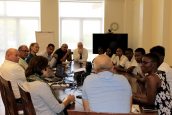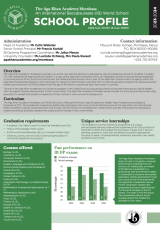Omidyar Network Visits AKA Mombasa
 Ray Zinsli along with six Academy studentsOn Thursday, 24 August 2017, Aga Khan Foundation (AKF) had the opportunity to host Omidyar Network at the Aga Khan Academy Mombasa. The Academy showcased their outreach programmes, specifically the Talent Identification Programme (TIP) and the Professional Development and Outreach Center (PDC). “People are inherently capable, but they often lack opportunity. We believe if we invest in people, through opportunity, they will create positive returns for themselves, their families, and the world at large.” This is the philosophy and fundamental belief of the Omidyar Network, a non-profit started by Pierre Omidyar, who is also the founder of eBay. Their philosophy is aligned with the Academies Mission and Vision of creating effective, ethical leaders from diverse cultural, religious and socioeconomic backgrounds to empower them to make a postive contribtuion to society.
Ray Zinsli along with six Academy studentsOn Thursday, 24 August 2017, Aga Khan Foundation (AKF) had the opportunity to host Omidyar Network at the Aga Khan Academy Mombasa. The Academy showcased their outreach programmes, specifically the Talent Identification Programme (TIP) and the Professional Development and Outreach Center (PDC). “People are inherently capable, but they often lack opportunity. We believe if we invest in people, through opportunity, they will create positive returns for themselves, their families, and the world at large.” This is the philosophy and fundamental belief of the Omidyar Network, a non-profit started by Pierre Omidyar, who is also the founder of eBay. Their philosophy is aligned with the Academies Mission and Vision of creating effective, ethical leaders from diverse cultural, religious and socioeconomic backgrounds to empower them to make a postive contribtuion to society.
The Academy exemplifies the monumental social development that AKF has made through the TIP, directed by Paul Davis, the Dean of Admissions. “Research has been done to create and design tests that identify leadership skills within students that do not have the resources to show their skills,” Davis said. The programme aims to identify young students that are talented, yet lack the economic privilege to attend the Academy.
 Aga Khan Academy Mombasa hosts Omidyar NetworkA group of six students that went through the intensive testing, were awarded scholarships and now reside on campus shared their stories with the guests from Omidyar Network. The students come from underprivileged communities and have been immersed in the Academy’s diverse, pluralistic and academically rigorous setting. Ohad Mutua, a year 10 student, recounted how a leader was stereotyped in his home community: “Being a leader is being a prefect,” Ohad said. He went on to say that prefects were the ones who reported the noisemakers to the teachers. Now, Ohad says the Academy has helped change his perspective on what a true leader is – someone who cooperates, collaborates and makes informed ethical decisions. Along with Ohad, was Lovely Mughalu, a year 10, who still has a strong connection to her home village. For her personal project, Lovely has been researching factors that lead to early childhood pregnancy and has come up with intervention solutions to prevent the high number of girls dropping out of school.
Aga Khan Academy Mombasa hosts Omidyar NetworkA group of six students that went through the intensive testing, were awarded scholarships and now reside on campus shared their stories with the guests from Omidyar Network. The students come from underprivileged communities and have been immersed in the Academy’s diverse, pluralistic and academically rigorous setting. Ohad Mutua, a year 10 student, recounted how a leader was stereotyped in his home community: “Being a leader is being a prefect,” Ohad said. He went on to say that prefects were the ones who reported the noisemakers to the teachers. Now, Ohad says the Academy has helped change his perspective on what a true leader is – someone who cooperates, collaborates and makes informed ethical decisions. Along with Ohad, was Lovely Mughalu, a year 10, who still has a strong connection to her home village. For her personal project, Lovely has been researching factors that lead to early childhood pregnancy and has come up with intervention solutions to prevent the high number of girls dropping out of school.
Sal Giambanco, who leads the human capital and operations functions at Omidyar Network, was across the table from the students, listening attentively as they expressed how the Academy has helped them evolve and grow. “These are the change-agents transforming their own communities and the country,” Sal said. “The teachers and staff must be doing something right.”
By Sabena Lodhi





